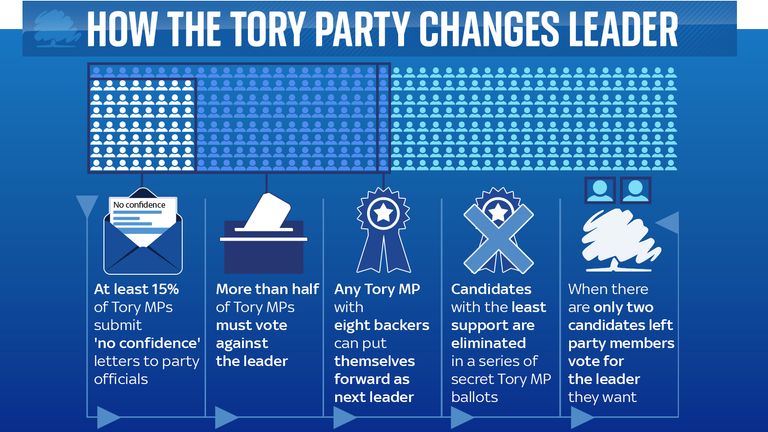[ad_1]
When the result of the confidence vote is declared, Sir Graham Brady will read out how many Tory MPs have backed Boris Johnson’s leadership, and how many have voted against him.
A simple majority of the 359 MPs is required for the prime minister to win the vote – which works out as 180.
While a win theoretically means Mr Johnson is immune from challenge for 12 months, that is unlikely to be the case in practice – just ask Theresa May, who resigned five months after winning a confidence vote in 2018.
So what would the different scales of victory mean for the PM’s future?
PM greeted by ‘clapping and banging’ by Tory MPs – follow latest updates
Scenario 1: 180+ vote against the PM
Mr Johnson will have lost the confidence of a majority of the Conservative Parliamentary Party. This result would trigger a leadership contest he cannot stand in.
Two and a half years after winning a landslide he would be out of office. No single event will be blamed – just a snowball of criticism of a man who – post Brexit – has struggled to get a grip on government and was beset by personal failings and weak, regularly changing lieutenants whose behaviour reflected that of the man at the top.
The choice the Tory party’s most successful electoral asset since Margaret Thatcher will face is whether to sit on the backbenches, or walk away from Westminster once his successor is elected.
Scenario 2: 133-180 vote against the PM
The rebellion would be bigger than that suffered by Ms May in January 2019. This would be very difficult territory for Mr Johnson, who is not inclined to bow to pressure. The big question would be whether the cabinet move against him. Perhaps after the two by-elections later this month? It is not a cabinet known for its robust approach to Mr Johnson, but there might be much pleading by MPs to put Mr Johnson out of his misery.
There is speculation that up to five members of the cabinet may be voting against Mr Johnson. This is impossible to prove and we will never know. What would be more certain – in this scenario – is that a significant minority of those on the government payroll would have voted against the man running the organisation they are part of.
Mr Johnson would be determined to hang on – as is his right under Tory party rules. However, precedent suggests there would be no good outcome from this result, and he could face being ousted like Mrs May or just take the Tories down to defeat at the next general election like Sir John Major.
Scenario 3: 100-133 vote against the PM
This would be a large and wounding rebellion – but smaller than that suffered by Theresa May when she faced a confidence vote in 2018.
Mr Johnson would seek to downplay the result, potentially launching a series of big initiatives including a bust up with Brussels over Northern Ireland and remaking the civil service. He would need to fill the agenda with items other than his own probity, to counter accusations of drift and a lack of grip.
Read more:
Who could replace Boris Johnson as the next Tory leader and prime minister?
How does a no confidence vote work and will the PM be ousted?
Which Conservative MPs have called on Boris Johnson to quit?
He would not be in the clear, however. There would be some significant challenges ahead of the next general election – including the escalating cost of living crisis amid questions about what Conservative economic policy actually looks like, privileges committee investigation into whether he misled parliament and a public inquiry into the government’s handling of the pandemic more broadly.
Scenario 4: Fewer than 100 vote against the PM
Mr Johnson would claim this vote shows he can now move on from questions over his leadership. By keeping the number of MPs voting against him below 100, he would argue he has contained the rebellion to the disaffected – those who have been sacked from government positions or remain supporters who were never reconciled to his leadership in the first place.
It would mean he has secured the backing not just of those MPs on the party payroll – the 160 or so ministers, junior ministers and those that serve as parliamentary aides – but also a significant number of those on the backbenches.
However, those who have voiced criticism publicly – like Jeremy Hunt and Jesse Norman – would never be able to undo the damage to the party brand caused by attacking a leader who survived them publicly. There could also be trouble ahead in the Commons – it takes just 40 Tory MPs to switch sides for Mr Johnson to lose a vote.
[ad_2]


